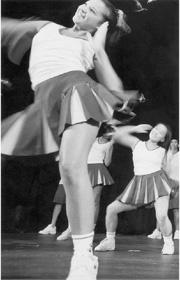SOMETIMES YOUR BEST work comes out when you’re under pressure. As director and Saturday Night Live alum Julia Sweeney remarks in the local documentary 800 Feet Can Make a Movie, there’s no time to second-guess yourself when your resources are limited. You have to trust your instincts and get the work done.
3 years of fly filmmaking
plays September 16-19 at Little Theater
Sweeney was one of nine directors who participated in Fly Filmmaking, a three-year-old program organized by Cinema Seattle and WigglyWorld Studios. The program, held during the last week of the annual Seattle International Film Festival, challenges independent filmmakers to cast, shoot, edit, and screen a short film in just seven days. Filmmakers are provided with a local cast and crew, a minimal camera-and-lighting package, post-production facilities, and 800 feet (or 22 minutes’ worth) of film—which obviates the luxury of reshooting a scene many times. Aside from being a test of how well people can work under extreme pressure, Fly Filmmaking is a great get-back-to-basics experiment that can revitalize filmmakers’ energies in their craft.
Surprisingly, for all the rush and restrictions of the program, many of the films feature seamless storytelling and good acting. The 1999 showcase, composed of shorts by Sweeney, LA filmmaker Paul Todisco, and NYC filmmaker Adrienne Shelly, is especially accomplished. And the fact that two of them are intelligent stories about women’s relationships—a topic that too often gets buried in Hollywood saccharine—is all the more impressive.
Sweeney’s short, Shadow Life, has a pregnant woman named Anne meet her husband Jerry’s ex-girlfriend, Claire, by chance in a beauty salon. The two can’t be more opposite: Claire is dark and sophisticated, and knows Jerry from when they were living together in Europe. Anne is all Midwestern sweetness, snorting a nervous laugh; her perceptions of Jerry as a family man and Little League coach are disturbed as Claire reveals more and more about his wilder past. It’s a sensitive slice-of-life that captures the difficulties of accepting your partner’s history—you know you shouldn’t be jealous of their past, but it’s hard not to be sometimes—and Sweeney gives us a nice surprise ending that lets both women shine.
Paul Todisco’s film Skanks is a funny and poignant look at two teenage girls whose world is divided into “skanks” and “babes.” Unfortunately, our narrator, Janine, is a skank—she’s chubby and awkward, wearing pink jeans with black cowboy boots, while her friend Dawn is blonde, thin, and dressed like she stepped out of Seventeen. They hang out at the mall and meet two guys—and guess who ends up with the skank who looks like a hippie Barney Rubble?
That part of the story, while funny, is pretty typical, but Skanks is daring and unflinching as it goes further in revealing Janine’s troubled self-perception. At the mall, she and Dawn eat powdered doughnuts and vomit—but Janine, no matter how far she sticks her finger down her throat, can’t throw up the calories. Looking at the perfect Dawn, she laments in a voice-over, “I wish I could throw up like her.”
Perhaps male viewers will be appalled or incredulous. During the press screening, I was the only one laughing at Skanks—and I happened to be the only female. I laughed because the story, while sad in many ways, rang so true. Plenty of girls know what it’s like to hang out with a friend who’s prettier and eat junk food and throw up together. Until now, I’d never seen a film that had the courage to show it.
The third short is Adrienne Shelly’s The Shadows of Bob and Zelda, which uses classic techniques of silent film, such as mimed acting and music, that crescendos and ebbs to heighten the drama. A blissful image of a dancing couple is darkened when shadows from their closets emerge, and loud, hollow sounds of wind passing through a tunnel become almost unbearable. That this was the first time that Shelly and her actors made a film with no dialogue is testimony to the experimental spirit that infuses Fly Filmmaking.






